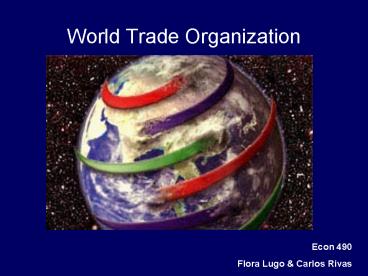World Trade Organization - PowerPoint PPT Presentation
1 / 17
Title:
World Trade Organization
Description:
World Trade Organization Econ 490 Flora Lugo & Carlos Rivas Formation WTO replaced GATT in 1995 - one nation, one vote (like GATT) GATT-General Agreement on Tariffs ... – PowerPoint PPT presentation
Number of Views:1322
Avg rating:3.0/5.0
Title: World Trade Organization
1
World Trade Organization
Econ 490 Flora Lugo Carlos Rivas
2
Formation
- WTO replaced GATT in 1995
- - one nation, one vote (like GATT)
- GATT-General Agreement on Tariffs and Trade
- Formed in 1947
- Came out of the Bretton Woods conference
- Part of three organizations that became part of
framework to help manage the postwar global
economy (along with IMF, World Bank) - An informal trade organization
3
GATT
- A. Principles
- Trade Liberalization
- Liberalization
- 1. liberal view
- - free market
- - limited government
- - more optimistic about state cooperation
- - trade is a positive sum game
- Increase trade
- - reduce tariffs
- Nondiscrimination
- Most Favored Nation
- - A trade advantage given to one GATT member
must be extended to every other GATT member - National Treatment
- - A member must treat foreign products at least
as favorably as domestic products (i.e. taxes,
regulations) - Reciprocity
- A state benefiting from another states trade
concessions should provide roughly equal benefits
in return - Safeguards and Contingent Measures
- Limit of imports that may cause harm to a states
industry or economy
4
Safeguards and Contingent Trade Measures
Safeguards
Temporary Import Surges BOP problems Infant Industries Permanent General Exceptions National Security Tariff Renegotiations Contingent Trade Measures Anti-dumping duties (ADDs) Countervailing duties (CVDs)
5
Rounds of GATT and WTO Negotiations
Name Years Subjects Covered Countries Participating
Geneva 1947 Tariffs 23
Annecy 1949 Tariffs 13
Torquay 1951 Tariffs 38
Geneva 1956 Tariffs 26
Dillon 1960-1961 Tariffs 26
Kennedy 1964-1967 Tariffs and antidumping measures 62
Tokyo 1973-1979 Tariffs, nontariff measures, plurilateral agreements 102
Uruguay 1986-1993 Tariffs, nontariff measures, rules, services, intellectual property, dispute settlement, trade-related investment, textiles, agriculture, creation of WTO 123
Doha (WTO) 1999- Agriculture, services, tariffs, nontariff measures, intellectual property, dispute settlement 149
6
GATT in Jeopardy
- Non-Tariff Barriers
- -not covered in GATT rules
- Agriculture had been an exception to restrictions
on import quotas and export subsidies - Agriculture and Textiles mostly excluded from
regulations - Easy to circumvent regulations (VER)
- Dispute Settlement procedures weak
- U.S. and other Developed Countries (DCs) wanted
scope to go beyond trade in goods to trade in
services, intellectual property and investment - Most Less Developed Countries (LDCs) did not
agree to negotiations in the Tokyo Round
7
WTO Replaces GATT
- Formal, legally constituted organization
- Oversees trade treaties negotiated in the Uruguay
Round GATS, TRIPS, TRIMS along with GATT - Meets at least every 2 years
- Dispute settlements (DS) more binding and timely
member states use DS process more then with GATT - Greater effort to integrate LDCs and transition
economies - More involvement with Non governmental
Organizations and civil society groups
1995
8
(No Transcript)
9
(No Transcript)
10
Disputes
- What causes a dispute?
- When a member country of the WTO believes another
member country is violating an agreement or a
commitment that has been set within the WTO. - Agreements are those negotiated under the Rounds
of GATT/ WTO - How is it resolved?
- The Dispute Settlement Body composed of member
governments (all WTO members) work together to
set an agreement.
11
Dispute Settlement Process
12
Steps ( Lengths) of Settlement
- Consultation (60 days)
- The Panel (45 days / 6 months)
- Final Report (3 weeks)
- Report becomes a Ruling (60 days)
- Either side can appeal a panels ruling.
- 5. Appeals Report (60-90 days)
- 6. Appeals Report becomes a Ruling (30 days)
13
Disputes (Examples)
- Valenzuela Import Licensing Measures on Certain
Agricultural Products - Complainant United States
- Respondent Valenzuela
- Mexico Tax Measures on Soft Drinks and Other
Beverages - Complainant United States
- Respondent Mexico
14
Disputes (cont)
- The dispute settlement agreement stresses that
prompt compliance with recommendations or
rulings of the Dispute Settlement Body is
essential in order to ensure effective resolution
of disputes to the benefit of all Members. - Outstanding cases Some cases have remained in
the consultation phase since 1995.
15
Doha Round UnResolved
- LDCs
- - want Special and Differentiated Treatment
monitored and enforced - - G-20 of LDCs (Brazil, China, India) call for
end of EU and U.S. agricultural export subsidies - - North promised technical assistance not
enough - DCs
- - want LDCs reduce barriers to nonagricultural
imports - - strengthen and extend agreements for services
trade and intellectual property trade - -Major DCs ( ex.EU and Japan) want to expand WTO
to new areas government procurement, trade
facilitation, competition policy - Fast Track Authority expired 2007
16
WTOs Future
- G-7 even with one nation one vote system LDcs
have less influence - Increase in Regional Trade Agreements
- Doha Round unresolved
- Global Recession and Protectionism
17
References
- www.wto.org
- Cohn, A. (2008). Global Political Economy. (pp.
195-227). Pearson Education, Inc. - http//www.wto.org/english/thewto_e/whatis_e/whati
s_e.htm - http//www.wto.org/english/tratop_e/dispu_e/dispu_
e.htm - http//events.streamlogics.com/wto/2004/html/001.h
tml

